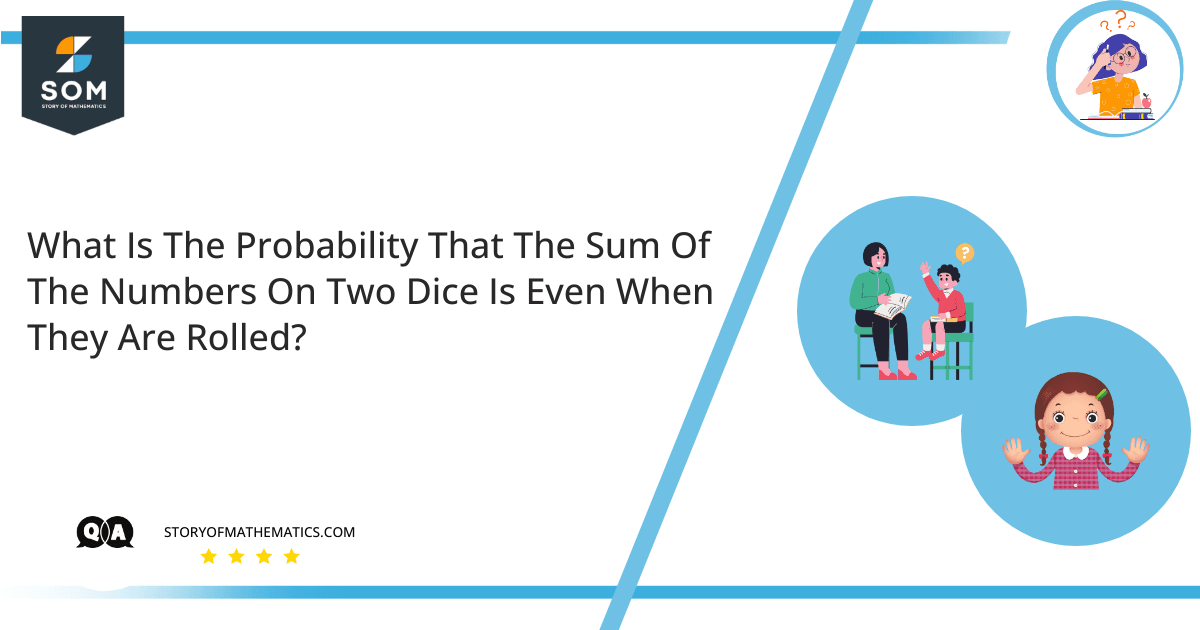
This problem aims to familiarize us with random events and their predictable outcomes. The concepts required to solve this problem are mostly related to probability, and probability distribution.
So probability is a method to predict the occurrence of a random event, and its value can be between zero and one. It measures the likelihood of an event, events that are difficult to predict an outcome. Its formal definition is that a possibility of an event occurring is equal to the ratio of favorable outcomes and the total number of tries.
Given as:
\[\text{Pobability of event to occur} = \dfrac{\text{Number of favourable events}}{\text{Total number of events}}\]
Expert Answer
So as per the statement, a total of two dices are rolled and we are to find the probability that the sum of numbers on those two dices is an even number.
If we look at a single dice, we find that there are a total of $6$ outcomes, of which only $3$ outcomes are even, the rest are subsequently odd numbers. Lets create a sample space for one dice:
\[ S_{\text{one dice}} = {1, 2, 3, 4, 5, 6} \]
Out of which the even numbers are:
\[ S_{even} = {2, 4, 6} \]
So the probability of getting an even number with a single dice is:
\[ P_1(E) = \dfrac{\text{Even numbers}}{\text{Total numbers}} \]
\[ P_1(E) = \dfrac{3}{6} \]
\[ P_1(E) = \dfrac{1}{2} \]
So the probability that the number would be an even number is $\dfrac{1}{2}$.
Similarly, we will create a sample space for the outcome of two dies:
\[ S_2 = \begin{matrix} (1,1), (1,2), (1,3), (1,4), (1,5), (1,6),\\ (2,1), (2,2), (2,3), (2,4), (2,5), (2,6),\\ (3,1), (3,2), (3,3), (3,4), (3,5), (3,6),\\ (4,1), (4,2), (4,3), (4,4), (4,5), (4,6), \\ (5,1), (5,2), (5,3), (5,4), (5,5), (5,6), \\ (6,1), (6,2), (6,3), (6,4), (6,5), (6,6) \end{matrix}\]
Out of which the even numbers are:
\[S_{even}=\begin{matrix} (1,1), (1,3), (1,5),\\ (2,2), (2,4), (2,6),\\ (3,1), (3,3), (3,5),\\ (4,2), (4,4), (4,6),\\(5,1), (5,3), (5,5),\\(6,2), (6,4), (6,6)\end{matrix}\]
So there are $18$ possibilities to get an even number. Thus, the probability becomes:
\[ P_2(E) = \dfrac{\text{Even numbers}}{\text{Total numbers}}\]
\[ P_2(E)=\dfrac{18}{36}\]
\[ P_2(E)=\dfrac{1}{2}\]
Hence, the probability that the sum would be an even number is $\dfrac{1}{2}$.
Numerical Result
The probability that the sum of outcomes of two dies would be an even number is $\dfrac{1}{2}$.
Example
Two dice are rolled such that the event $A = 5$ is the sum of the numbers revealed on the two dice, and $B = 3$ is the event of at least one of the dice showing the number. Find whether the two events are mutually exclusive, or exhaustive?
The total number of outcomes of two dice is $n(S)=(6\times 6)=36$.
Now the sample space for $A$ is:
$A={(1,4),(2,3),(3,2),(4,1)}$
And $B$ is:
$A={(3,1),(3,2),(3,3),(3,4),(3,5),(1,3),(2,3),(3,3),(4,3),(5,3),(6,3)}$
Let’s check if $A$ and $B$ are mutually exclusive:
\[ A \cap B = {(2,3), (3,2)} \neq 0\]
Hence, $A$ and $B$ are not mutually exclusive.
Now for an exhaustive event:
\[ A\cup B \neq S\]
Thus $A$ and $B$ are not exhaustive events as well.
